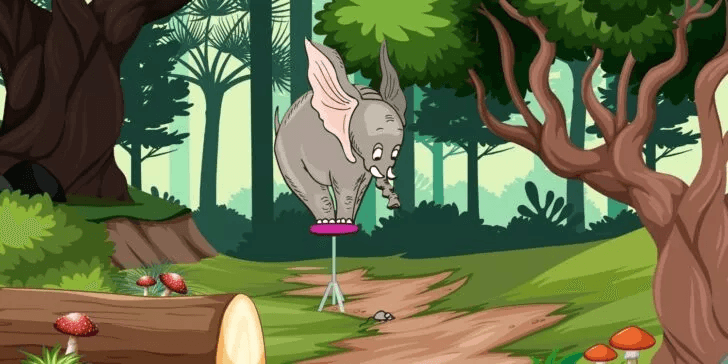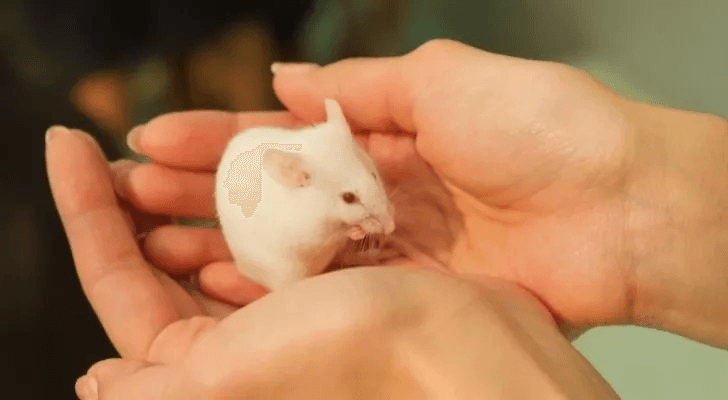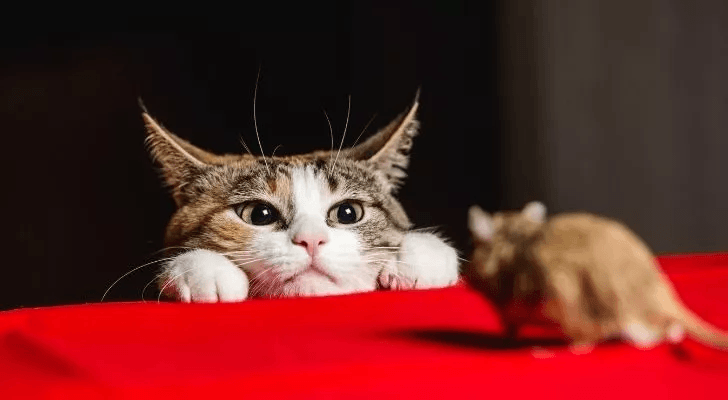
Remember that scene in Dumbo where he first meets Timothy mouse?There are countless scenes like that on TV where elephants cower at the sight of a mouse.Why would a nearly 14,000 lbs elephant be afraid of a tiny, harmless mouse?
It’s not just on TV shows. People have actually spotted elephants running away from mice.
Could there be more to these sightings? Read on as we separate fact from fiction.
Are elephants scared of mice?

Contrary to popular belief, elephants aren’t scared of mice. A circus elephant trainer, Troy Metzler, set out to test the theory himself.
He performed his own elephant and mouse experiment. In his demonstration, Metzler held a mouse in front of an elephant to see its reaction.
Surprisingly, the elephant didn’t seem interested in the tiny creature.
So, he proved that a little mouse doesn’t scare the mighty elephant.
Why do elephants run from mice?

That’s because elephants can’t see very well.
You might have experienced this too; imagine you’re sitting quietly, and a bug flies by.
You only spot it in your peripheral vision, but it’s enough to make you run in the opposite direction.
You could even let out a small scream, and when you settle down, you may find that it was only a harmless ladybug.
It’s the same for elephants. They can’t see the mouse clearly.
And the mouse moves so fast that it startles them.
That also explains why the mouse didn’t move the circus elephant in Metzler’s hand.
Where did the myth come from?

The idea that elephants are afraid of mice had existed long before it became a popular trope in cartoons.
A Greek fable from as far back as 77 AD supported this belief. In the tale, a mouse climbs an elephant’s trunk and drives him nuts.
More recently, in the 1600s, a popular explanation for the mice and elephant myth came up.
Allen Moulin, an Irish physician, believed that elephants didn’t have the small protective cartilage in their throat — epiglottis.
This cartilage keeps foreign bodies out to prevent choking. Moulin believed that if the mouse got into the elephant’s throat, it could block its airway.
And this served as the popular explanation for the relationship between an elephant and a mouse.
People would realize much later that elephants have epiglottis cartilage.
So, choking on a mouse isn’t a real risk.
Furthermore, elephant researcher Richard Lair noted that an elephant could quite easily blow a mouse out of its trunk if one ever climbed in.
Are other animals scared of mice?

A mouse scurrying around can startle any animal.
Protective reflexes will make animals jump back, fearing any unexpected creature running around.
Many animals, such as horses, cats, or dogs, will jump back when a mouse runs by.
They’re not truly afraid. The mouse just caught them by surprise.
What tiny animal scares an elephant?

Elephants might not be afraid of mice, but there’s another tiny animal that scares them.
It’s bees!
What could a tiny bee possibly do to the gigantic elephant? Not much.
Elephants have very thick skin. So, a bee’s stinger can’t cause much damage.
However, African bees can get pretty aggressive. They attack in hundreds, stinging the elephant everywhere.
During the attack, bees can sting sensitive regions such as their trunk, eyes, and mouth.
Researchers found that Asian elephants are afraid of bees too.
Young elephant calves may be more vulnerable to bee stings.
And some believe that a large swarm of thousands of bees can seriously hurt a young elephant.
How can bees save elephants?

Elephant conservationists use the elephant’s fear of bees to save their lives.
While searching for food, elephants can wander into farmlands. Farmers defending their crops can hurt the wandering elephants or themselves.
Farmers are now putting beehives on their fences to scare elephants off instead.
When the elephants try crossing the fence, they disturb the bees.
The buzzing bee sounds are enough to turn the elephants away from the farm.
This strategy is already showing great success.
Elephants are amazing creatures. Aside from their gigantic sizes, they’re also intelligent and gentle giants.
Now you can impress your friends by telling them the truth about the relationship between elephants, mice, and bees.





